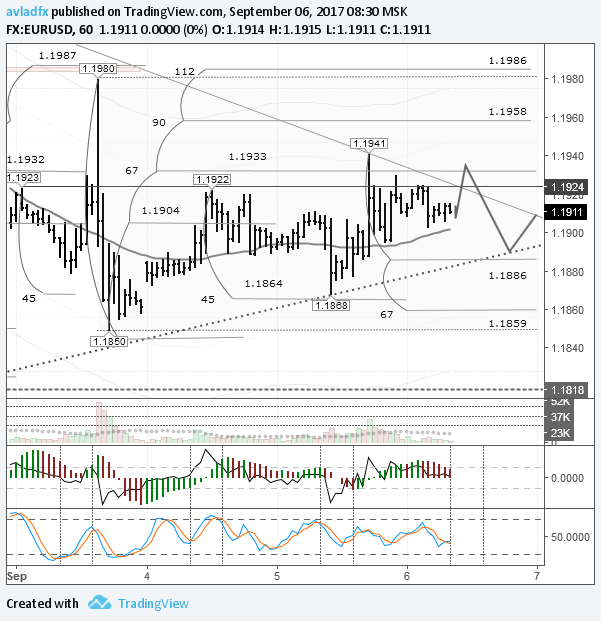
Previous:
On Tuesday the 5th of September, trading on the euro/dollar pair closed slightly up. After falling to 1.1868, the euro recovered to 1.1941. This growth was brought about by a general weakening of the dollar after the publication of weak data on factory orders in the US in July.
The index for factory orders in the US in July came out at -3.3% (forecast: -3.0%, previous: 3.2%).
US 10Y bond yields have fallen from 2.17% to 2.056%, its lowest level since the presidential election. After such a drop in bond yields, the euro should have risen to around 1.1980 but its growth was held up by the upcoming ECB meeting.
FOMC member Lael Brainard’s comments weighed down on the dollar. She said that due to a long period of low inflation, they should be particularly cautious on the question of further rate hikes. Now let’s take a look at the technical picture on the hourly timeframe.
Day’s news (GMT+3):

EURUSD rate on the hourly. Source: TradingView
The euro/dollar pair has been in a sideways trend for the last 3 days. The price has been trading within the range from the 1st of September (1.1850 – 1.1980) for 2 out of these 3 days. Until the price exits this range, expect fluctuations around the LB balance line.
For now, the euro’s situation remains unclear. Bulls tried to break through the downwards trend line yesterday, but fell short. They failed because the bears received some support from the falling euro/pound cross as we await the ECB meeting.
So, look at what we have now. Buyers continue to believe that the ECB could announce the reversal of its quantitative easing program at their meeting on monetary policy on the 7th of September. Sellers reckon that the regulator will maintain this program until the end of October, before going on to announce a reduction in their asset purchasing program, which is currently at 60bn EUR a month.
















